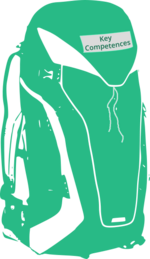Difference between revisions of "What Competency-based learning is..."
From Competendo - Digital Toolbox
(→Experiential Learning) |
(→Articles) |
||
| Line 92: | Line 92: | ||
</div> | </div> | ||
| − | |||
<hr class=boldline> | <hr class=boldline> | ||
| + | ==Competency Frameworks== | ||
| + | <noinclude>{{:Competency Frameworks}}</noinclude> | ||
| − | + | <hr class=boldline> | |
| − | + | ==Competency Frameworks for Educators== | |
| − | + | <noinclude>{{:Competency Frameworks For Educators}}</noinclude> | |
| − | |||
| − | |||
| − | |||
| − | |||
| − | |||
| − | |||
| − | |||
| − | |||
| − | |||
| − | |||
| − | |||
| − | |||
| − | |||
| − | |||
| − | |||
| − | |||
| − | |||
| − | |||
| − | |||
| − | < | ||
| − | == | ||
| − | |||
| − | |||
| − | |||
| − | |||
| − | |||
| − | |||
| − | < | ||
| − | |||
| − | |||
| − | |||
| − | |||
| − | |||
| − | </ | ||
| − | |||
| − | |||
| − | |||
</div> | </div> | ||
Revision as of 14:51, 30 April 2020
⑩
10 Reasons for Competency Based Democracy Learning
We might conclude, that education and qualification needs to respond to that observation and cover the broad range of experience, attitudes, book-knowledge and skills that one has and needs for his or her active and autonomously shaped life.
10 Reasons for Competency Based Learning
- Competency based facilitation gives learners ownership over their learning and is a cooperative social process – real and authentic empowerment.
- It takes takes strengths, needs, and abilities of learners for serious. Be more often surprised by the abilities and strengths of your learners.
- It appreciates the diversity of perspectives and learning styles in a group as a potential (instead of trying to even these qualities).
- Competency based facilitation encourages creativity, because it shapes new connections between topics, people, concepts.
- It stimulates a sense of initiative and leads to self-efficacy when learners experience a gain of competencies by successful applying their knowledge.
- It's relevant, because it allows learners to apply their abilities in a lot of different social roles and situations.
- It's more flexible, because it understands learning as a process instead of subordinating it under the regime of a too linear curriculum.
- It allows you to focus more on social processes and communication skills, because competency learning is a social process.
- You are more free from unrealistic learning goals or unreal assumptions regarding the needs and abilities of your learners, because mainly the learners abilities are in the focus of competency based learning.
- Thanks to competency based learning you know better, how cooperation with different fields of education, social engagement or non-formal education increases the quality of education. Because such cooperation allows your learners to apply the learned better under real life conditions.
...and 5 Problematic Practices
Beyond all missionary words we need to acknowledge, that competency based learning is not always easy to implement. It is often a disruptive element in the learning culture of a school, of an academy or an organization. Changes are never easy and dilemmas appear between old proven and new risky ways of educating and unclarity how they might go together. For instance:
What Competency-centered Learning Should Not Be
- A New Layer of Bureaucracy: It's intended to give learners and teachers more freedom instead more rules or procedures. It requires flexible teachers/facilitators and more freedom for learners.
- Tailoristic: It's a humanist and holistic approach aiming to support autonomy, not usability. However, some promoters of competencies misunderstand competency-learning as emphasizing on skill training.
- Autonomy terror: Competency is not a self-optimization tool nor for assessing the fittest or increasing competitiveness. Competencies are neutral, although every learning environment has its ideological imprinting and is expressing its values as well through certain frameworks or approaches.
- Stupidity: Competence-centered learning involves knowledge, attitude and skills. But some understand that it is a practice-only approach. Such learning does not strengthen the ability of a learner to assess and reflect for what aim he or she wants to learn.
Articles
Competency Frameworks
Competency Frameworks for Educators
DEFINITION:
"A competency is more than just knowledge and skills. It involves the ability to meet complex demands, by drawing on and mobilizing psychosocial resources (including skills and attitudes) in a particular context."
Related:




